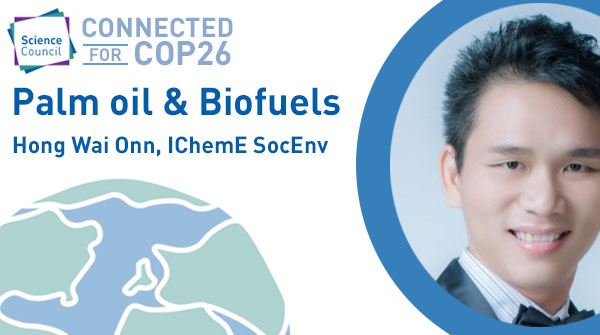
Connected to COP26: Using palm oil by-products to produce biofuels
Hong Wai Onn CEng CEnv, Chemical Engineer and Commercial Head at Novozymes, on behalf of Institution of Chemical Engineers and Society for the Environment.
Climate change is a global problem, and in order to avoid its worst effects, 196 parties adopted the Paris Agreement at the 21st Conference of Parties (COP 21) in December 2015. The Paris Agreement is the best and most promising effort to tackle climate change and its goal is to limit global warming to below 2°C, but preferably to below 1.5oC, compared to pre-industrial levels.
To achieve this long-term temperature goal, each country must outline its plans and contributions to achieve net-zero carbon emissions by 2050. Net-zero emissions are vitally important in the fight to stabilise global temperatures. In simple terms, net-zero refers to the balance between the amount of greenhouse gases produced from human activity and the amount of greenhouse gases removed from the atmosphere.
The palm oil industry
Palm oil is the world’s most produced, consumed and traded vegetable oil with widespread uses including manufacturing of products, animal feed and biofuels. Despite this, the irresponsible production of palm oil has led to the destruction of large areas of rainforest, wildlife losses, exacerbated climate change and impacts to local communities.
With increasing pressure to be more sustainable, the palm oil industry has started their transition towards net-zero emissions in response to the call for global climate action. I am proud to be a part of the effort to help make the industry greener.
The palm oil value chain can be divided into three segments; upstream processes (covering oil palm plantations, mills, and kernel crushing plants), midstream processes (involving palm oil refineries), and downstream processes which covers the production of biodiesel.
During the production of crude palm oil, a liquid by-product, palm oil mill effluent (POME), also known as palm sludge oil, is generated. POME presents a promising opportunity to become an attractive natural source for biodiesel production.
Using palm oil for biodiesel
To date, refined palm oil has been one of the most common feedstock types in the production of biodiesel. However, the biodiesel industry has been under pressure, due to rising concerns about feedstock availability and pricing. Consequently, cheap, low-quality, and non-food oils, like POME oil, have long been considered for biodiesel feedstock. This explains why POME oil has been classified as a material that is eligible for double-counting under the EU Renewable Energy Directive. This means that POME oil-based biodiesel can be counted twice in the calculation of shares of renewable energies in transport.
Biodiesel production from fatty acid feedstocks like POME oil is traditionally problematic, with a complex two-stage process that involves high costs, harsh chemicals and high energy input – all contributing to large capital and operational expenses.
Using enzymes for a greener future
To address the limitations of traditional biodiesel production, Novozymes (a global biotechnology company) introduced a biological solution to the industry. Enzymatic technology enables biodiesel producers to produce high-quality biodiesel from POME oil using biological catalysts called enzymes which speed up the rate of chemical reactions. The process, uses water and methanol to convert the fatty acids in POME oil into biodiesel. The biodiesel product, either in pure form or blended with petro-diesel, could be used as a substitute for conventional petro-diesel used by trucks and diesel generators within palm oil plantations.
Many commercial biodiesel plants currently operate enzymatic technology. If all POME oil produced by the two largest palm oil producers, Indonesia and Malaysia, is used for biodiesel production, approximately 1.3 million tonnes of biodiesel could be produced annually; thus translating into an energy content of 7.4% of the EU’s total biodiesel consumption in 2019.
In summary, the enzymatic process is known to be a clean and environmentally friendly technique for biodiesel production. Furthermore, it enables palm oil producers to process waste into a fuel source and make the industry greener and support its net-zero emissions transition goal.
Connect to Hong:
Twitter: @hongwaionn
LinkedIn: https://www.linkedin.com/in/hong-wai-onn-aa659850/
Read the rest of the blog series here.
